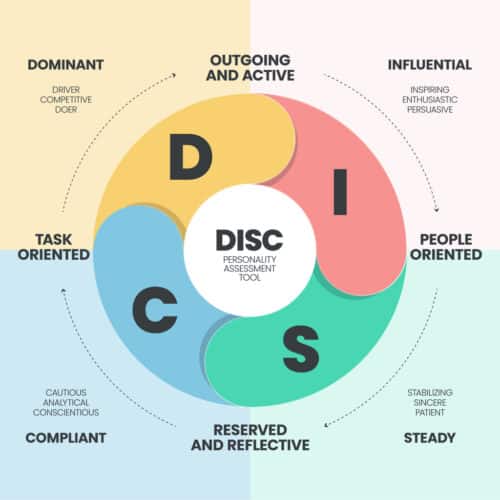Discovering DISC Styles and Their Impact on the Personality Wheel
In the bustling world of small business, where every team member’s contribution is crucial, understanding the intricacies of personality and team dynamics can be a game-changer. This is where DISC styles come into play, offering a profound insight into the behavioral tendencies of your staff and how these can impact your business operations. For small business owners, mastering the nuances of DISC styles is not just about putting the right person in the right job—it’s about crafting a workplace environment that fosters harmony, understanding, and productivity.
What are DISC Styles?
DISC is a behavior assessment tool based on the theories of psychologist William Moulton Marston, which focuses on four different personality traits: Dominance (D), Influence (I), Steadiness (S), and Conscientiousness (C). These styles reflect how individuals respond to challenges, rules, and procedures, and their interactions with others in the workplace. By understanding DISC styles, you can more effectively communicate, delegate, and motivate your team, aligning each member’s strengths with your business’s goals.
Personality Wheel: How DISC Styles are Explained
While DISC styles provide a direct look at behavioral traits, integrating these into the broader framework of the Personality Wheel allows for a more nuanced exploration of how these traits interact and influence overall personality. The Personality Wheel is a comprehensive model that maps out various personality aspects in a visually engaging and easy-to-understand format, helping you see how DISC styles contribute to broader behavioral patterns. This integration is essential for small business owners looking to dive deeper into personality assessments, providing a holistic view that encompasses a range of behavioral cues and tendencies.
As we explore DISC styles and their impact on the Personality Wheel throughout this blog, we will uncover actionable insights and strategies tailored specifically for small business owners. This exploration will not only enhance your ability to manage and lead but also elevate your team’s cohesion and operational efficiency. Join us as we delve into the dynamic world of DISC styles and discover how they can transform your approach to business leadership and team management.
DISC Styles: A Complete Overview
Definition and History
The DISC assessment tool is based on the theory developed by psychologist William Moulton Marston in the 1920s. Marston aimed to categorize normal behavioral patterns into four primary types, positing that they are driven by a person’s self-perception in relation to the environment. In the 1950s, this framework was adapted and developed into the DISC assessment tool by industrial psychologist Walter Vernon Clarke. Today, DISC is used worldwide, helping to understand behavioral styles, enhance workplace communication, and promote better teamwork.
The Four DISC Styles
Each of the four DISC styles—Dominance, Influence, Steadiness, and Conscientiousness—describes a unique set of behavioral characteristics that can be quite informative in a professional setting:
- Dominance (D): Individuals with high ‘D’ are results-oriented, assertive, and prefer to lead. In the workplace, they are decisive and prefer high levels of autonomy. They thrive on competition and challenges, making them effective in roles that require quick decision-making and leadership.
- Influence (I): Those with a high ‘I’ style are enthusiastic, optimistic, and persuasive. They are great communicators and often excel in situations where networking and collaboration are needed. In professional settings, they help foster a team-oriented environment and are often effective in roles that require influencing others.
- Steadiness (S): Individuals high in ‘S’ are dependable, calm, and supportive. They prefer stability and consistency and are very good at cooperating with others. In the workplace, they excel in roles that require methodical, consistent effort, and provide support or service to others.
- Conscientiousness (C): Those who exhibit high ‘C’ are detail-oriented, plan ahead, and are meticulous with standards. They value accuracy and are analytical in their approach to problems. In professional settings, they are pivotal in roles that require precision and a disciplined approach.
By understanding these DISC styles, small business owners can strategically align job roles to match the behavioral strengths of their team, leading to more effective and harmonious workplace dynamics.
The Personality Wheel Explained:

DISC infographic has 4 types of personality such as D dominant, I influential, C compliant, and S steady. Business and education concepts to improve work productivity.
Introduction to the Personality Wheel
The Personality Wheel is a comprehensive model that helps visualize the full spectrum of human personality traits. It expands on the DISC model by integrating a wider range of behavioral characteristics, providing a more holistic view of an individual’s personality.
Integration of DISC Styles
DISC styles form a crucial part of the Personality Wheel by offering key insights into core behavior patterns. Each DISC style interacts with other elements of the Personality Wheel, influencing how individuals respond to stress, teamwork, leadership, and communication challenges. By understanding where DISC styles fit within the Personality Wheel, small business owners can develop more nuanced strategies for managing and motivating their teams.
Visuals and Examples
Diagrams or infographics that map DISC styles onto the Personality Wheel can illustrate how different traits influence each other, enhancing the utility of DISC in organizational settings. These visuals can serve as practical tools for small business owners to better understand and apply personality insights in everyday business operations.
Application of DISC Styles in Business
Enhancing Team Communication
Knowledge of DISC styles can dramatically improve how team members interact with each other by tailoring communication methods according to each member’s preferred style. For instance, a team member with a high ‘I’ might respond best to energetic, collaborative communication, whereas a ‘C’ style individual may prefer detailed, factual communication.
Improving Leadership
Leaders can enhance their effectiveness by adapting their leadership style to suit the DISC profiles of their team members. Understanding these profiles allows leaders to connect more deeply, motivate effectively, and drive each team member towards common business goals.
Recruitment and Selection
Integrating DISC assessments into the recruitment process helps ensure candidates not only have the skills and experience necessary for the role but also the personality fit that complements the existing team. This can lead to higher job satisfaction and retention rates, crucial for maintaining continuity and stability within small businesses.
By applying DISC styles in these practical ways, small business owners can enhance operational efficiency, improve interpersonal dynamics, and foster a workplace environment that promotes long-term business success.
Leveraging DISC Styles for Personal Development
Personal Growth
Understanding one’s own DISC style is not only beneficial for improving professional relationships but also for personal growth and career advancement. By recognizing their strengths and areas for improvement, individuals can tailor their approach to communication, conflict resolution, and teamwork. For example, someone with a high Dominance (D) might work on balancing their assertive approach with increased empathy, particularly in collaborative settings, which can lead to more effective leadership and personal relationships.
Training and Workshops
Small businesses can greatly benefit from investing in DISC style training and workshops for their employees. Such programs can include:
- Interactive Workshops: Engage employees with activities that help them identify not only their own DISC styles but also understand those of their colleagues to foster better teamwork.
- Tailored Development Programs: Implement development plans that use DISC insights to help employees enhance their professional skills in areas like leadership, sales techniques, or customer service, depending on their DISC style.
- Continuous Learning Sessions: Offer regular training sessions that build on initial DISC training and introduce advanced concepts and applications, ensuring ongoing personal and professional development.
Integrating DISC Styles with Other Personality Tools
Comparison with Other Tools
DISC assessments provide a focused insight into how individuals are likely to react and communicate in various settings, which is somewhat simpler and more application-specific than other tools like the Myers-Briggs Type Indicator (MBTI) or the Big Five. MBTI categorizes how people perceive the world and make decisions, offering 16 types. This approach is more nuanced but also more complex compared to DISC’s four types. The Big Five assesses people on five broad dimensions of personality without focusing explicitly on workplace behaviors.
Complementary Use
Using DISC in conjunction with these tools can offer a more comprehensive understanding of employee personalities. For instance, while DISC can help tailor communication within teams, combining it with the Big Five can add depth by understanding an individual’s openness to new experiences or their degree of agreeableness. This comprehensive approach can help in creating highly tailored development programs and improving team dynamics.
Challenges and Considerations of DISC Methods
Accuracy and Misinterpretations
While DISC provides valuable insights, there are potential pitfalls in interpretation that must be cautiously managed:
- Overgeneralization: Avoid making sweeping judgments based on DISC profiles, as individuals can exhibit traits from more than one category depending on the context.
- Situational Influences: Consider external factors that might influence DISC assessment results, such as current job satisfaction or personal circumstances.
Ethical Considerations
The ethical use of psychological tools like DISC in the workplace is critical:
- Informed Consent: Ensure that employees understand why DISC assessments are being conducted and how the information will be used.
- Confidentiality: Maintain strict confidentiality of DISC assessment results, using them constructively for development rather than punitive measures.
- Non-discriminatory Practices: Use DISC results to aid in employee development, not for making employment decisions that could be seen as discriminatory.
By addressing these challenges and ethical considerations, small businesses can effectively leverage DISC styles to enhance both individual and organizational growth, ensuring that the implementation of these tools contributes positively to the workplace culture and individual career paths.
Explore the Depths of DISC Styles with Experienced Professionals at AMB Performance Group
As we’ve explored throughout this discussion, understanding and applying DISC styles within the framework of the personality wheel offers invaluable benefits for small business owners. By integrating into your business practices, you can significantly enhance team communication, improve leadership effectiveness, and optimize your hiring processes. These steps of the process aid to better match individuals with roles where they can thrive.
Embracing DISC assessments empowers you to create a more harmonious and productive workplace. It provides a clear path to understanding the diverse behavioral styles of your team members, allowing for more tailored management strategies and a boost in overall team performance.
We encourage you to explore how these insights can be specifically beneficial for your business. We’re offering free DISC assessments for business owners eager to unlock the potential of their teams. See how DISC assessments can transform your team dynamics and boost your organizational performance today!

